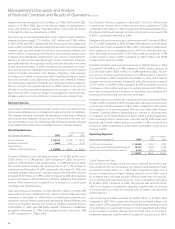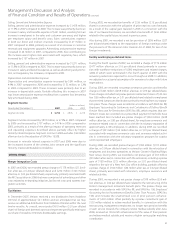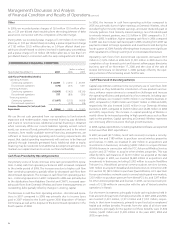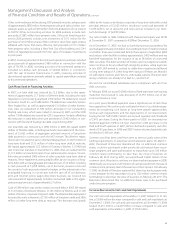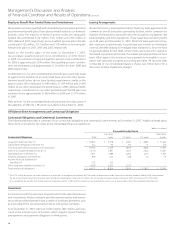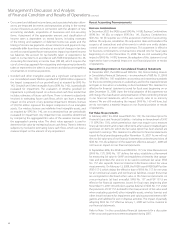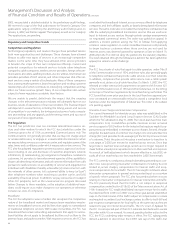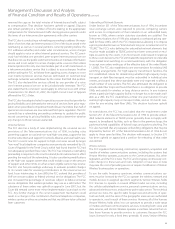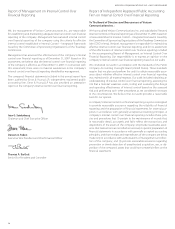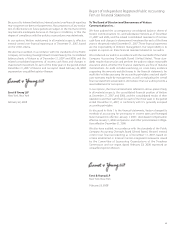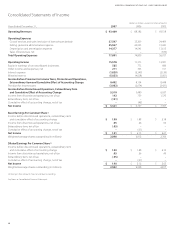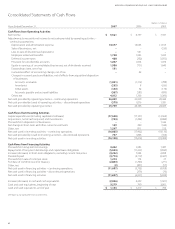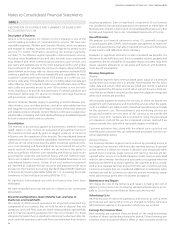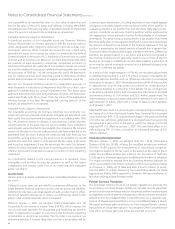Verizon Wireless 2007 Annual Report Download - page 38
Download and view the complete annual report
Please find page 38 of the 2007 Verizon Wireless annual report below. You can navigate through the pages in the report by either clicking on the pages listed below, or by using the keyword search tool below to find specific information within the annual report.must periodically seek renewal of those licenses. Although the FCC has
routinely renewed all of Verizon Wireless’ licenses that have come up for
renewal to date, challenges could be brought against the licenses in the
future. If a wireless license were revoked or not renewed upon expira-
tion, Verizon Wireless would not be permitted to provide services on the
licensed spectrum in the area covered by that license.
The FCC has also imposed specific mandates on carriers that operate
wireless communications systems, which increase Verizon Wireless’ costs.
These mandates include requirements that Verizon Wireless: (i) meet
specific construction and geographic coverage requirements during
the license term; (ii) meet technical operating standards that, among
other things, limit the radio frequency radiation from mobile devices and
antennas;(iii)deploy“Enhanced911”wirelessservicesthatprovidethe
wireless caller’s number, location and other information upon request by
a state or local public safety agency that handles 911 calls; (iv) provide
backup electric power at most cell sites in the event electric utility ser-
vice is disrupted; and (v) comply with regulations for the construction of
transmitters and towers that, among other things, restrict siting of towers
in environmentally sensitive locations and in places where the towers
wouldaffectasitelistedoreligibleforlistingontheNationalRegisterof
Historic Places. Changes to these mandates could require Verizon Wireless
to make changes to operations or increase its costs of compliance.
The Communications Act imposes restrictions on foreign ownership of
U.S. wireless systems. The FCC has approved the interest that Vodafone
Group Plc holds, through various of its subsidiaries, in Verizon Wireless.
The FCC may need to approve any increase in Vodafone’s interest or the
acquisition of an ownership interest by other foreign entities. In addition,
as part of the FCC’s approval of Vodafone’s ownership interest, Verizon
Wireless, Verizon and Vodafone entered into an agreement with the
U.S. Department of Defense, Department of Justice and Federal Bureau
of Investigation which imposes national security and law enforce-
ment-related obligations on the ways in which Verizon Wireless stores
information and otherwise conducts its business.
Verizon Wireless anticipates that it will need additional spectrum to meet
future demand. It can meet spectrum needs by purchasing licenses or
leasing spectrum from other licensees, or by acquiring new spectrum
licenses from the FCC. Under the Communications Act, before Verizon
Wireless can acquire a license from another licensee in order to expand
its coverage or its spectrum capacity in a particular area, it must file an
application with the FCC, and the FCC can grant the application only after
a period for public notice and comment. This review process can delay
acquisition of spectrum needed to expand services. The Communications
Act also requires the FCC to award new licenses for most commercial wire-
less services through a competitive bidding process in which spectrum is
awarded to bidders in an auction. Verizon Wireless participated in spec-
trum auctions to acquire licenses for personal communication service
and most recently advanced wireless service. In addition, the FCC began
conducting an auction of spectrum in the 700 MHz band on January
24, 2008. This spectrum is currently used for UHF television operations
but by law those operations must cease no later than February 17, 2009.
Verizon Wireless filed an application on December 3, 2007, to qualify as
a bidder in this auction, and on January 14, 2008, the FCC announced
that Verizon Wireless and 213 other applicants had qualified as eligible
to bid in the auction. The FCC determined that bidding in this auction
36
Management’s Discussion and Analysis
ofFinancialConditionandResultsofOperations continued
willbe“anonymous,”whichmeansthatpriortoandduringthecourse
of the auction(s), the FCC will not make public any information about
a specific applicant’s upfront deposit or its bids. In addition, FCC rules
restrict information that bidders may disclose about their participation in
the auction. The FCC also adopted service rules that will impose costs on
licensees that acquire the 700 MHz band spectrum, including minimum
coverage mandates by specific dates during the license terms, and, for
approximatelyone-thirdofthespectrum,“openaccess”requirements,
which generally require licensees of that spectrum to allow customers
to use devices and applications of their choice, subject to certain limits.
The open access requirements are the subject of a pending appeal in
which Verizon Wireless has intervened. The timing of future auctions, and
the spectrum being sold, may not match Verizon Wireless’ needs, and the
company may not be able to secure the spectrum in the amounts and/or
in the markets it seeks through the current or any future auction.
The FCC is also conducting several proceedings to explore making
additional spectrum available for licensed and/or unlicensed use. These
proceedings could increase radio interference to Verizon Wireless’ opera-
tions from other spectrum users and could impact the ways in which
it uses spectrum, the capacity of that spectrum to carry traffic, and the
value of that spectrum.
State Regulation and Local Approvals
Telephone Operations
State public utility commissions regulate our telephone operations with
respect to certain telecommunications intrastate rates and services and
other matters. Our competitive local exchange carrier and long distance
operations are generally classified as nondominant and lightly regulated
the same as other similarly situated carriers. Our incumbent local
exchange operations are generally classified as dominant. These latter
operations predominantly are subject to alternative forms of regulation
(AFORs)inthevariousstates,althoughtheyremainsubjecttorateof
return regulation in a few states. Arizona, Illinois, Nevada, New Hampshire,
Oregon and Washington are rate of return regulated with various levels
of pricing flexibility for competitive services. California, Connecticut,
Delaware, the District of Columbia, Florida, Indiana, Maryland, Michigan,
Maine, Massachusetts, New Jersey, New York, North Carolina, Ohio,
Pennsylvania,RhodeIsland,SouthCarolina,Texas,Vermont,Virginia,West
VirginiaandWisconsinareunderAFORswithvariouslevelsofpricing
flexibility,detariffing,andservicequalitystandards.NoneoftheAFORs
include earnings regulation. In Idaho, Verizon has made the election
under a recent statutory amendment into a deregulatory regime that
phases out all price regulation.
Video
Companies that provide cable service over a cable system are typically
subject to state and/or local cable television rules and regulations. As
noted above, cable operators generally must obtain a local cable fran-
chise from each local unit of government prior to providing cable service
in that local area. Some states have recently enacted legislation that
enables cable operators to apply for, and obtain, a single cable franchise
at the state, rather than local, level. To date, Verizon has applied for and
received state-issued franchises in California, Indiana, Florida, New Jersey,
Texas and the unincorporated areas of Delaware. Virginia law provides us
the option of entering a given franchise area using state standards if local
franchise negotiations are unsuccessful.


